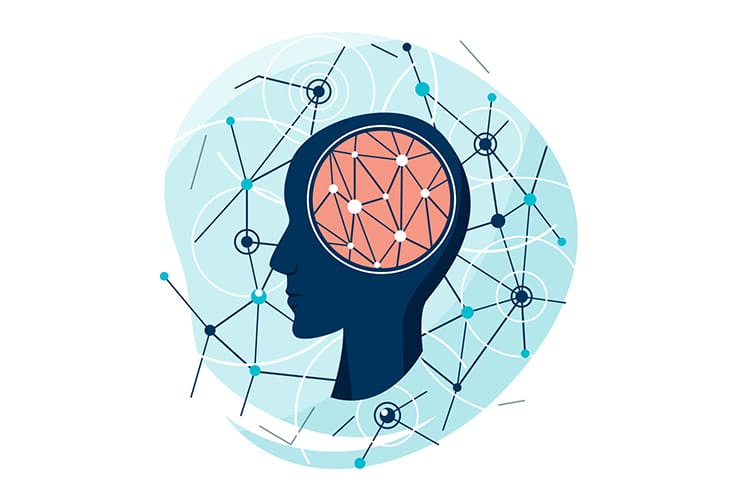May 17, 2021
By Katherine Ponte, JD, MBA, CPRP

Schizophrenia may be the most poorly understood and stigmatized mental illness diagnosis. It affects less than 1% of the population and begins early in life, especially in males. The stereotypical portrayals of people living with schizophrenia as unpredictable, dangerous, irredeemable, and often homeless or incarcerated, are extremely harmful, create stigma and can lead to hopelessness.
Contrary to these inaccurate generalizations, it is possible to live a good life with schizophrenia. In fact, schizophrenia is not always severe and chronic. Research has shown that although about one-third of people living with schizophrenia struggle with their symptoms, the majority are able to achieve stability and recovery.
To lessen the harmful effects of stigma, it’s essential to spread awareness about what this mental illness actually is.
Central features of schizophrenia
Many people with schizophrenia also have problems with substance use, especially alcohol and other drugs, which can make psychosis or apathy worse.
Different stages of schizophrenia
The course of this illness varies over a person’s lifetime and can include acute or subtle onset, continuous or episodic psychosis, with or without clinical deterioration. Factors that can influence the course of the illness include non-adherence to treatment, severity, number of episodes, relapses and the duration of the illness.
The following are the potential stages in schizophrenia and potential response strategies.
Comprehensive and integrated treatment is the most effective approach to treating schizophrenia. With treatment, most symptoms can greatly improve, and the likelihood of recurring episodes is reduced.
We often associate schizophrenia only with positive symptoms such as psychosis, which are often the focus of medical treatment. However, the treatment of negative symptoms and cognitive impairments are critically important to long-term functioning. Unfortunately, cognition and negative symptoms can be more difficult to treat and represent major unmet therapeutic needs.
Care should also be person-centered, rather than illness-centered, which can lead to more compassionate care. The components of treatment include:
1. Medication
People with schizophrenia usually need prescription medication, and most will do better with continued use of medication to help control positive symptoms and prevent relapse. Additional medication may also benefit treatment of co-occurring depression, sleep disturbance and anxiety disorders.
Some side effects, like tardive dyskinesia (TD) can be serious. Weight gain can also be serious, and is far more common than TD, as it is most often neglected in terms of reducing or avoiding increased risk for cardiovascular and stroke risks. Failure to address these may increase the risk of non-adherence. Patient participation in treatment decisions can also motivate adherence.
2. Psychosocial Interventions
These forms of treatment refer to therapy, education and support programs. Therapy can help people develop coping skills. Social skills training can enhance personal interactions. Psychoeducation for both the person living with mental illness and their family can enhance understanding of the illness. Supported work programs for people who desire these services also have a large impact. Moreover, psychosocial intervention can support personal strengths and improve quality of life.
3. Cognitive Therapy
Cognitive remediation (CR) may address “cognitive deficits,” which is the strongest predictor of functional outcome. These deficits can impact attention, memory, executive function, social cognition and other faculties. They can interfere with various aspects of daily functioning, including employment, independent living and quality of life. CR may be delivered via computerized programs, of varying length and complexity, or one-on-one by a trained clinician.
Cognitive behavioral therapy (CBT) can also help with cognitive functioning. It is a highly structured and standardized type of therapy with different approaches to positive and negative symptoms. CBT can help people with schizophrenia cope with their symptoms by examining and reevaluating their thoughts and perceptions of experiences.
4. Relapse Prevention Plan
Relapses in schizophrenia can negatively impact the course of the illness and the person’s quality of life. They can lead to deterioration in social, occupational, and financial status and increase the burden of care on the family. There is typically a long recovery period after each hospitalization, so relapses can be very discouraging.
A clear, actionable plan can minimize the risk of a relapse and situation before it escalates and requires more intensive care, including a possible hospitalization.
It can help to:
People with schizophrenia can lead fulfilling lives with evidence-based treatment, hope of recovery, self-empowerment, support from friends and family, and caring treatment providers. And, importantly, we need to foster empathy and compassion that will allow those with schizophrenia to thrive.
Note: I would like to immensely thank Professor Will Carpenter, the world’s leading schizophrenia scholar, for generously taking the time to review this blog post, for helping me learn more about schizophrenia and for his tremendous dedication to our schizophrenia community. He is the editor of Schizophrenia Bulletin, which is the best resource for information on schizophrenia.
Katherine Ponte is happily living in recovery from severe bipolar I disorder. She’s the Founder of ForLikeMinds’ mental illness peer support community, BipolarThriving: Recovery Coaching and Psych Ward Greeting Cards. Katherine is also a faculty member of the Yale University Program for Recovery and Community Health and has authored ForLikeMinds: Mental Illness Recovery Insights.
We’re always accepting submissions to the NAMI Blog! We feature the latest research, stories of recovery, ways to end stigma and strategies for living well with mental illness. Most importantly: We feature your voices.
LEARN MORENAMI HelpLine is available M-F, 10 a.m. – 10 p.m. ET. Call 800-950-6264,
text “NAMI” to 62640, or email. In a crisis, call or text 988 (24/7).